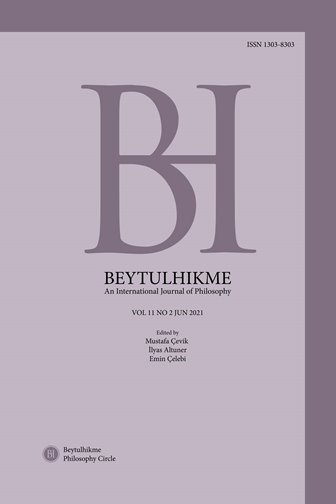Author :
Abstract
Bu makale, epistemik akranlarımızla anlaşmazlığa düştüğümüzde epistemik açıdan takınmamız gereken tavrın karşımızdakinin epistemik akranımız olduğunu düşünmek için sahip olduğumuz nedenlere bağlı olduğunu savunmaktadır. Literatürde David Christen’ın savunduğu Bağımsızlık Prensibi’ni eleştiren makale, bu prensibe aykırı davranmanın hangi durumlarda epistemik açıdan uygun olduğunu incelemektedir.
Keywords
Abstract
This paper argues that the proper epistemic response to peer disagreement should depend, in part, on our grounds for judging the other person to be an epistemic peer. In particular, it argues that we can violate David Christensen’s Independence principle if (a) our judgment that another person is an epistemic peer can only be established by track record judgments from the ground level, or (b) we put less trust in the reasons we relied on in judging the other person to be an epistemic peer than the reasons we relied on in arriving at the judgment that is the subject of our disagreement.
Keywords
- Alston, W. P. (1993). The Reliability of Sense Perception. Ithaca: Cornell University Press.
- Christensen, D. (2007). Epistemology of Disagreement: The Good News. The Phi- losophical Review, 116 (2), 187-217.
- Elga, A. (2007). Reflection and Disagreement. Noûs, 41 (3), 478-502.
- Enoch, D. (2010). Not Just a Truthometer: Taking Oneself Seriously (But Not Too Seriously) in Cases of Peer Disagreement. Mind, 476, 953-997.
- Foley, R. (2001). Intellectual Trust in Oneself and Others. Cambridge: Cambridge Uni- versity Press.
- Kelly, T. (2005). The Epistemic Significance of Disagreement. Oxford Studies in Epistemology, vol. 1. (Eds. T. S. Gendler & J. Hawthorne). Oxford: Clarendon Press, 167-196.
- Kelly, T. (2011). Peer Disagreement and Higher Order Evidence. Social Epistemology: Essential Readings. (Eds. A. I. Goldman & D. Whitcomb). Oxford: Oxford University Press, 183-217.
- Kitcher, P. (1993). The Advancement of Science: Science without Legend, Objectivity wit- hout Illusions. Oxford: Oxford University Press.
- Lackey, J. (2010). A Justificationist View of Disagreement’s Epistemic Significance. Social Epistemology. (Eds. A. Haddock, A. Millar, & D. Pritchard). Oxford: Oxford University Press, 298-325.
- Zagzebski, L. T. (2012). Epistemic Authority: A Theory of Trust, Authority, and Auto- nomy in Belief. Oxford: Oxford University Press. Öz: Bu makale, epistemik akranlarımızla anlaşmazlığa düştüğümüzde epistemik açıdan takınmamız gereken tavrın karşımızdakinin epistemik akranımız olduğunu düşünmek için sahip olduğumuz nedenlere bağlı olduğunu savunmaktadır. Literatürde David Christen’ın savunduğu Bağımsızlık Prensibi’ni eleştiren makale, bu prensibe aykırı davranmanın hangi durumlarda epistemik açıdan uygun olduğunu incelemektedir. Anahtar Kelimeler: Epistemik akranlar arası anlaşmazlık, bağımsızlık prensibi, uzlaşmacılık, epistemik öz-güven.





